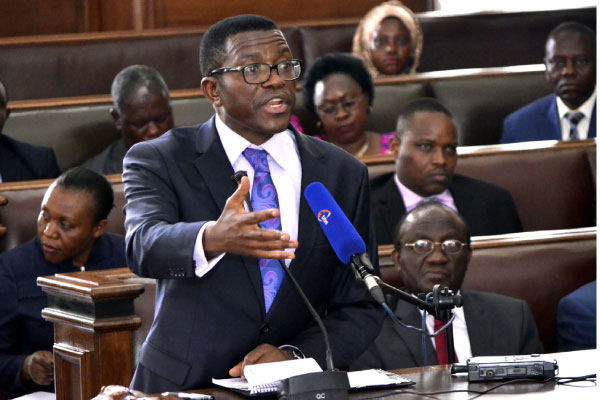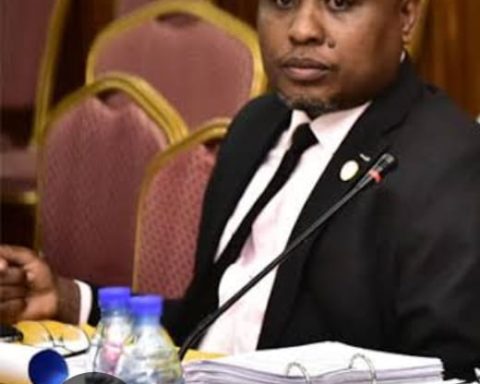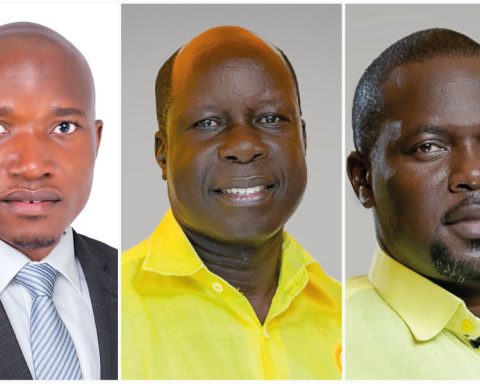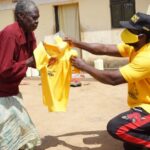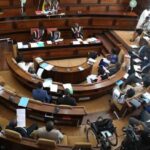The Katikkiro of Buganda Kingdom Charles Peter Mayiga has dismissed the talk of sectarian voting in Buganda during the presidential and parliamentary elections.
According to Mayiga, many issues need to be addressed in Buganda including the broken health system, poverty, unemployment and the unsatisfactory education system which might be some of the reasons the ruling party; Natiinal Resistence Movement (NRM) was washed away in Buganda during the recent concluded election.
“Roads are all broken. We have also witnessed very many murders, all of them happening in Buganda. These cause gray areas for the NRM and should simply be courageous and address them, ” Mayiga said.
The Katikkiro further put the spotlight on the voting in other parts of the country, saying it is actually testimony that those with the notion that Baganda are the ones that are tribalistic, are reading it all wrong.
“I don’t think the blame game is useful…saying that people are sectarian and were not voting NRM is totally wrong. In any case there is no area in Uganda where people are voted when they are not ethnically in that area like it is in Buganda. We have had many MPs who are not Baganda who have been elected in Buganda through the years, which is not very common in other areas,” he said.
Katikkiro Mayiga speaking about last week’s voting pattern in Central Uganda where the electorate voted highly against the ruling National Resistance Movement (NRM) party in the presidential and parliamentary election, Mayiga said that it is actually a political sign that there are areas that NRM needs to address.
“I find the tribal talk extremely misplaced. Most of the government programmes do not benefit the ordinary people. Poverty in the countryside is so much, and corruption is on rampage….those are all issues the NRM leaders should address with courage and humility, instead of picking on Bagada. It is not good for national unity.”
The Thursday 14th January elections saw President Yoweri Museveni and a number of his Ministers contesting for different parliamentary seats lost in Buganda region to the National Unity Platform (NUP) party led by Robert Kyagulanyi Ssentamu and some voices have pointed to sectarianism as one of the reason why people voted the way they did.
But Mayiga says that whoever is fronting the tribal views should first question why Kyagulanyi was voted for in Kamuli and other parts in Busoga and Museveni voted for highly in Western Uganda.
Bobi Wine on the campaign trail in Uganda.
“But Kyagulanyi was voted in Busoga as well, was voted in the East, even in the constituency of the Speaker Rebecca Kadaga. Kyagulanyi is not a Musoga. Museveni was voted in Ankole… and Buganda has voted for the president before, how do they explain that. That is cheap talk, and I think as a country we should abandon it,” Mayiga charged.
The Electoral Commission (EC) on Saturday declared Yoweri Kaguta Museveni as the winner of the January 14 presidential election securing him his sixth elected term as President of Uganda.
Museveni was contesting with 10 other candidates in the race for the country’s top office. According to declared results by EC Chairperson Justice Simon Byabakama, Museveni won with 5,851,037 votes (58.64 per cent). Museveni’s closest competitor, National Unity Platform’s -NUP Robert Kyagulanyi garnered 3,475,298 votes (34.83 per cent), followed by Forum for Democratic Change’s -FDC Patrick Oboi Amuriat with 323,536 votes (3.24 per cent), Alliance for National Transformation-ANT candidate Gen. Mugisha Muntu 65,334 votes (0.65 per cent), Democratic Party candidate Norbert Mao with 55,665 votes (0.56 per cent) and others.
But Data from the Electoral Commission-EC shows Kyagulanyi and his NUP’s won highly in majority of the districts in Buganda region in both the presidential and parliamentary election. Some of the districts that NUP won are Luwero, Kayunga, Mukono, Mityana, Gonna, Mpigi, Kalungu, Masaka, Kyotera, Kalangala, Wakiso, Buvuma, Buikwe, Kassanda and others.
The party also was successful in some districts in Eastern Uganda including Kamuli, Luuka, Iganga, Bugiri, Jinja, Mayuge and others.
Among the NRM Ministers who have lost in the election are Vice President Edward Kiwanuka Ssekandi who was defeated in Bukoto Central, Government Chief Whip Ruth Nankabirwa in the Kiboga district Woman MP race, State Minister for Higher Education John Muyingo in Bamunanika County, Minister for Information, Communication and Technology Judith Nabakooba in Mityana district Woman MP race.
Others are Minister of Trade Amelia Kyambadde who lost in Mawokota North, Minister for Agriculture Vincent Ssempijja in Kalungu East, Minister of State for Microfinance Haruna Kasolo in Kyotera County, Minister of State for Water Ronald Kibuule in Mukono North, Minister for Kampala Beti Kamya in Rubaga North, Minister of State for Youth and Children Affairs Florence Nakiwala Kigingi in Bukomansimbi Woman MP race and others.
The NRM party Secretary General Justine Kasule Lumumba has since said that the defeat in these areas by a young NUP opposition party is a sign of democracy ushered in by the NRM that people are free to choose who they want.
She however said that they would go back to the drawing board as a political party to ascertain why they lost in the Buganda region.
“We have to go back to the drawing board and get to know exactly what happened, why it happened and what is the way forward. It is a responsibility for us as leaders…not only here at the Center but working with leaders at the lower levels,” she said.
Asked what could have informed the bad performance in Buganda, Lumumba said that it could be gaps in service delivery.
Low Voter turn out
The Katikkiro has also questioned the low voter turnout in today’s Local Government election compared to last week’s enthusiasm exhibited by the electorate.
“The turnout today is low…of course the turnout for the presidential and parliamentary election was very high. I think it shows the importance the voters attach to the different levels of leadership for representation,” said Mayiga after he and his wife cast their vote in Lweza.
On Thursday last week, long queues were witnessed at different polling stations throughout the day as voters participated in the presidential and parliamentary election but the picture today is different with only a handful of people seen carrying out this civic duty.
The Electoral Commission –EC appointed today 20th January for voters in the different 11 cities across the country to choose Chairpersons, Directly Elected Councilors and Women Councilors for District Local Government Councils (LC V).
Here in Kampala, where the electorate is voting the Lord Mayor, Directly Elected Councilors and Women Councilors for Kampala Capital City Authority (KCCA), many people are seen buried in their private business as voting barely goes on.
He said that leaders at the district level are equally important as those at the president and parliamentary level and therefore a need for people to pay the process attention.
“Matters at the district level may need solutions by leaders at the district level. Councillors and women leaders are are important representative who can voice concerns from that level,” Mayiga said.
Mayiga said that it is very important that people come out and vote even in the remaining elections because leadership matters at every stage.
“If you got a poor leader at the village level, you may fail to solve the simplest of problems and it goes on all the way up to the highest level. So we need representatives who are focused and understand challenges faced by the people, so people should vote at every stage,” he explained.
**URN**
![]()

